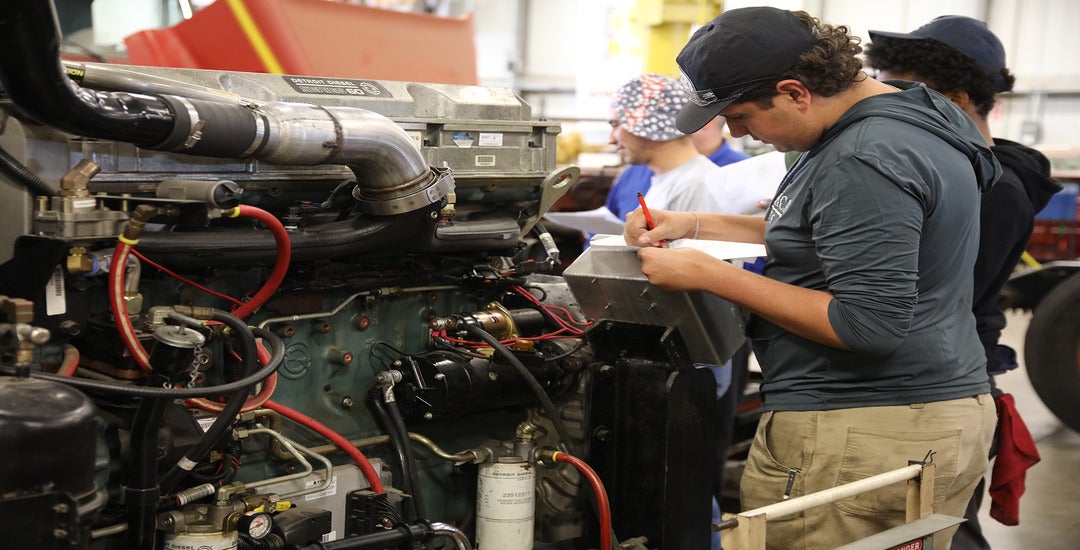For most Texans, the first vote they’ll cast this election cycle revolves around a little-known school with big plans for serving the state’s workforce.
Proposition 1 asks voters to deliver a significant financial boost to Texas State Technical College, a state-funded network of 11 campuses serving nearly 14,000 students this year, including about 1,000 through its Fort Bend County site. The extra revenue, expected to total tens of millions of dollars annually, would help TSTC grow its existing campuses and potentially expand to other parts of Texas.
Founded 60 years ago, TSTC is the state’s only publicly funded technical school. The college offers nearly 50 programs and awards students technical certifications and associate degrees.
“What TSTC focuses on are those high-demand jobs in Texas, and those change periodically and we change with those,” said Joe Arnold, TSTC’s deputy vice chancellor for government relations.
A Kinder Institute study in 2023 found about two-thirds of recent Houston-area high school graduates earned at least two credits — typically equivalent to four semesters of classes — in career and technical education.
TSTC has long taken a back seat in the state’s higher education system, with enrollment and name recognition trailing well behind Texas’ four-year and community college networks. But many of Texas’ largest business and trade associations have pushed to expand TSTC in response to the state’s skilled-labor shortage.
Earlier this year, state legislators near-unanimously supported asking voters to approve a constitutional amendment that would essentially create an $850 million state-funded endowment for the college, with proceeds going to capital projects like new buildings and land acquisition.
With early voting kicking off Monday, here’s a deeper look at TSTC and its impact on Texas.
What does TSTC offer?
TSTC provides virtual and in-person education tailored to industries with workforce shortages. The types of classes offered respond to the labor needs of local markets, with a particular focus on mechanical work, construction, precision production and health care studies.
About 60% of students earn a technical certificate and 40% obtain an associate degree, according to the Texas Higher Education Coordinating Board. By contrast, about 67% of community college graduates earn a degree, with the rest awarded a certificate.
Fifteen of the school’s programs are fully online, while the other 33 mix online and in-person instruction. Tuition and fees total about $8,500 for a full-time, in-state student this academic year.
Where are TSTC campuses?
TSTC offers classes at 11 campuses, many of which are located in rural areas and suburban outskirts.
The college’s Fort Bend County outpost opened in 2001 in a shared space with Wharton County Junior College before moving to a 160-acre campus in Rosenberg in 2016. No other Houston communities have a TSTC campus.
The Texas Legislature must pass legislation to establish a new TSTC campus.
Who attends TSTC?
TSTC is an open admissions college, meaning it does not have selective admission criteria, though applicants generally must have a high school or GED diploma and some programs have other admissions standards. High school students can attend TSTC through dual credit courses offered through their campus.
The college’s enrollment has hovered between roughly 11,000 and 14,000 students per year over the past decade. Student body makeup varies by campus, but collectively, the largest share of students are male, Latino and under the age of 25.
What are TSTC’s results?
Among students who enrolled between 2018 and 2020, about 43% of them earned a certificate or degree within four years of starting classes, according to Texas Higher Education Coordinating Board data. By comparison, about 34% of community college students and 45% of students attending a public four-year college or university earned a certificate or degree during the same period.
State data also shows about 90% of graduates have secured a job or enrolled at another state school within one year of graduation.
TSTC administrators noted that a small share of students acquire skills at the college and leave for full-time employment in their area of study before graduating.
Notably, TSTC’s state funding depends on how much former students’ and graduates’ wages increased after attending the college.
“The most important thing for us is job placement, because we’re not paid on enrollment,” Arnold said. “We’re paid on the outcomes of our graduates.”
How would Proposition 1 impact TSTC?
If Proposition 1 passes, school leaders expect the college would receive about $30 million to $50 million in the first year, with a legislatively mandated cap of $52 million. TSTC could only use the revenue to pay for new facilities, building repairs, land acquisition, equipment upgrades and other capital costs.
Unlike independent school districts and community colleges, TSTC does not rely on local property taxes to help fund construction and other capital projects. In the past, the college’s leadership has issued hundreds of millions of dollars in bonds to finance expansion and upgrades, with state lawmakers typically providing money to cover the costs.
Proposition 1 could provide TSTC with a more consistent stream of revenue for capital projects, helping the college more easily map out its future.
“It’s transformational. It will give the college the opportunity to plan and execute on capital needs and the growth,” Arnold said. “It’s going to allow us to operate in a world where we’re not just sitting there with our hands out, but we have something to bring to the table.”
College leaders said it’s too early to commit to plans for Fort Bend County if Proposition 1 succeeds, though they noted only half of the 160 acres are developed. School officials would evaluate workforce needs across the 11 campuses once Proposition 1 money starts flowing to determine how and where to spend it.



